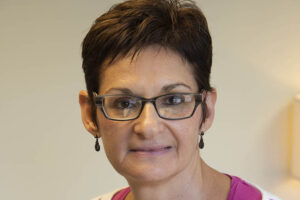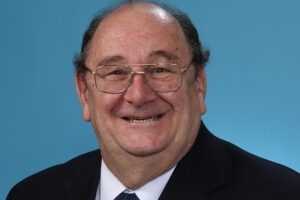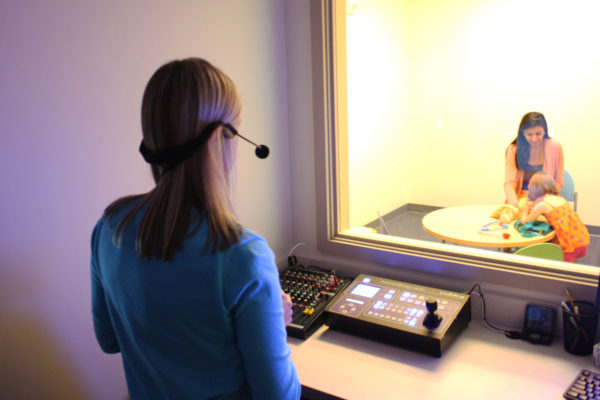Adrienne Davis and Joan Luby will receive Washington University in St. Louis’ 2020 faculty achievement awards, Chancellor Andrew D. Martin announced.
Davis, vice provost, the William M. Van Cleve Professor of Law and inaugural director of the university’s Center for the Study of Race, Ethnicity & Equity, will receive the Arthur Holly Compton Faculty Achievement Award.
Luby, MD, director of the School of Medicine’s Early Emotional Development Program and the Samuel and Mae S. Ludwig Professor of Child Psychiatry, will receive the Carl and Gerty Cori Faculty Achievement Award.
Martin also announced that Douglas F. Covey, the Andrew C. and Barbara B. Taylor Distinguished Professor of Psychiatry at the School of Medicine, will receive the Chancellor’s Award for Innovation and Entrepreneurship.
“Adrienne Davis, Joan Luby and Douglas Covey are all renowned experts in their fields,” Martin said. “Amid such trying times for our region and our world, the hard work and innovative research they are doing to increase diversity and improve mental health care is more critical than ever. I’m excited to present these awards to such accomplished colleagues.”
Typically, honorees receive their awards and give presentations of their scholarly work during a ceremony on campus in the fall. Details about this year’s event still are being determined.
Davis

As vice provost for faculty advancement and institutional diversity, over the last nine years, Davis has focused on helping the Danforth Campus design and implement a focused and flexible infrastructure for supporting diversity and inclusion and also helping the university cultivate its next generation of leaders.
She has given special attention to faculty diversity and professional development, consulting with deans, department chairs and hiring chairs to support their efforts to increase the percentage of Black and Hispanic/Latinx tenured and tenure-track faculty.
She also oversees a suite of academic mentoring, leadership development and academic pipeline programs in the Office of the Provost and has chaired or co-chaired key searches for senior leaders. From 2015-17, she was chair of the university’s Commission on Diversity and Inclusion, which was charged with designing a universitywide plan for diversity.
As a teacher and scholar, Davis focuses on “the law of daily life,” or how law regulates and affects people’s daily interactions, decisions and identities. She also holds courtesy appointments in several departments in Arts & Sciences, among them African and African-American studies; history; sociology; and women, gender and sexuality studies.
Davis has written extensively on the gendered and private law dimensions of American slavery; the legal regulation of intimacy; and how law and culture converge to distribute justice. She has edited two volumes and published articles in the Stanford Law Review, the Columbia Law Review and the California Law Review, as well as numerous other articles and book chapters.
She is director of the Center for the Study of Race, Ethnicity & Equity, which will launch this month and engage the university community to study how race and ethnicity are integral to the most complex and challenging issues of our time.
Davis is active in several professional associations. Among others, she is a member of the Association of American Law Schools Executive Committee for Section on Sexual Orientation and Gender Identity and past chair of the Law & Humanities Section of the American Association of Law Schools.
She earned a bachelor’s degree in Afro-American studies and in economics and political science from Yale and subsequently a juris doctorate from Yale Law School, where she was an executive committee editor of The Yale Law Journal.
Luby

Luby is well recognized for her research, which has changed the way psychiatry classifies mental illnesses in preschoolers, particularly depression.
Her clinical work and research focus on the emotional development of young children and how problems during early childhood alter the developmental trajectory for preschoolers, putting them at risk for mood disorders as they get older.
Luby’s research has demonstrated that forms of adversity, including poverty and neglect during the earliest years of life, are linked to changes in brain anatomy that increase the risks for learning difficulties, clinical depression and behavioral problems as children grow into adolescence and young adulthood. Her work also has shown that interventions involving nurturing and support from caregivers can prevent the development of some of those problems.
A Detroit native, Luby is the daughter of an innovator in biological psychiatry, Elliot D. Luby, MD, a School of Medicine graduate whose research focused on schizophrenia. Joan Luby joined the William Greenleaf Eliot Division of Child & Adolescent Psychiatry in 1990. One of the first things she did as a new faculty member was to open an infant/preschool clinic despite the fact that many developmental psychologists at the time argued that young children could not have psychiatric illnesses. Prior to Luby’s groundbreaking work, much research had suggested that secondary symptoms — for example, physical pain such as a stomachache — signaled psychiatric problems. But Luby’s research has shown that children with depression can be diagnosed mainly because they don’t seem to enjoy activities as much as others their age.
In later studies, collaborating with Deanna M. Barch, chair of Washington University’s Department of Psychological & Brain Sciences in Arts & Sciences, she discovered that the gray matter in the brains of depressed preschoolers was lower in volume and thinner in the cortex when the children reached school age, even after they recovered from depression. Gray matter is the tissue that connects brain cells and carries signals between them.
Luby earned her bachelor’s degree from Brown University and her medical degree from Wayne State University and completed her residency in psychiatry and a fellowship in child psychiatry at Stanford University. In 2004, she received the Gerald L. Klerman Award for Outstanding Clinical Research from the National Alliance for Research on Schizophrenia & Depression (now the Brain & Behavior Research Foundation).
Covey

Covey is leading the way in the development of a new class of drugs, called neurosteroids, as treatments for psychiatric illness.
A specialist in the chemistry and biology of steroids, Covey has spent years synthesizing and developing neuroactive steroid molecules. He studies how they work as anesthetics and analgesics and, more recently, has been evaluating the molecules for their potential to treat neurodegeneration and psychiatric illnesses, particularly clinical depression. The compounds Covey has been developing eventually may help psychiatric patients for whom current therapies don’t work.
His laboratory also has developed methods to determine exactly how neurosteroid molecules bind to proteins on nerve cells and other types of cells in the central nervous system. In addition to helping patients with depression, various molecules Covey has developed have shown promise as potential therapies for epilepsy and essential tremor.
He is a co-founder of SAGE Therapeutics, a company that is working to bring some of those compounds into clinical use. Covey’s work helped spur a collaboration between SAGE and Washington University to discover, develop and study neurosteroids. Much of that work is done through the Taylor Family Institute for Innovative Psychiatric Research, an effort that supports research collaborations between several departments at the School of Medicine, including psychiatry, anesthesiology, developmental biology, radiology, neurology and medicine.
Covey and other scientists involved with the institute have developed sophisticated tools to study how neurosteroids alter brain function and play a role in regulating cognition, emotion and motivation.
Covey earned a bachelor’s degree in chemistry in 1967 at Loyola College in Baltimore. He went on to earn master’s and doctoral degrees in chemistry from Johns Hopkins University. He joined the Washington University faculty in 1977.


